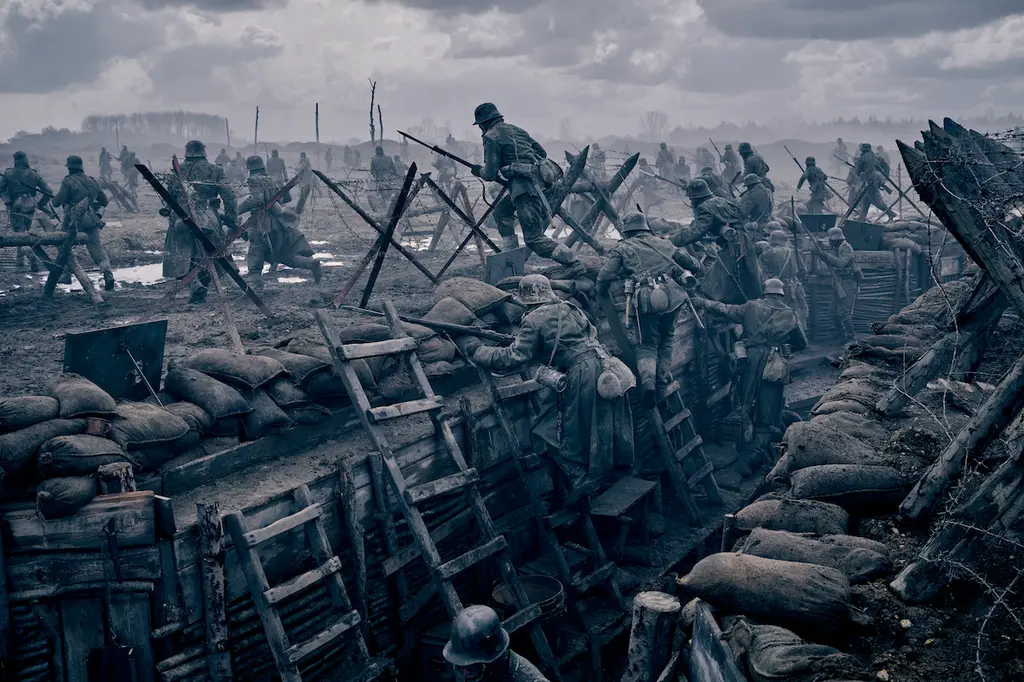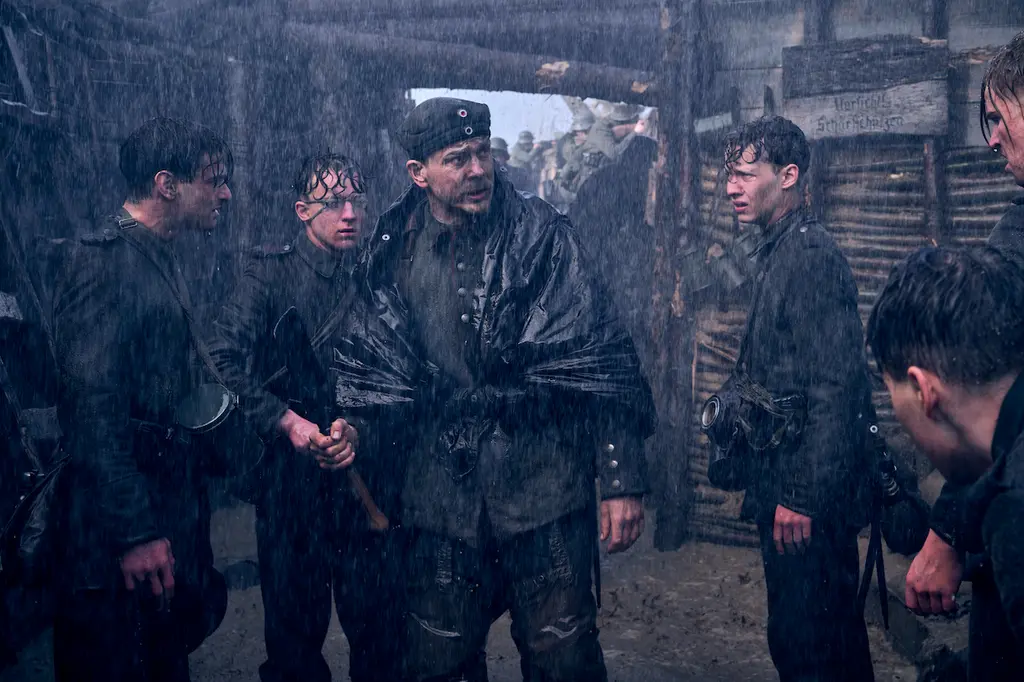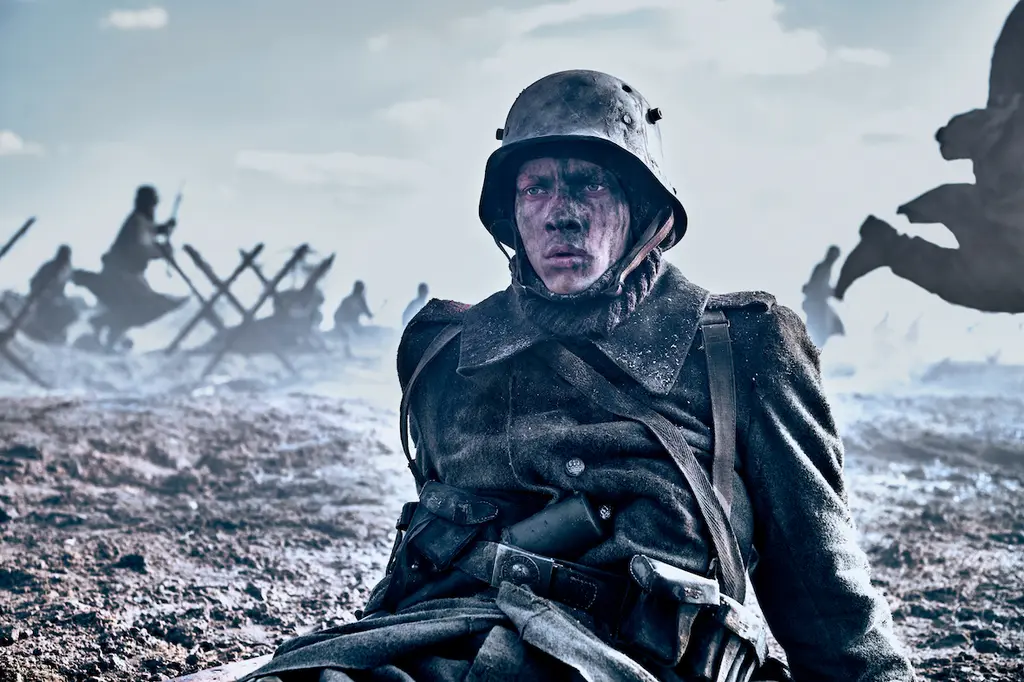Felix Kammerer on All Quiet On The Western Front and finding beauty in brutality

The German epic, an unlikely awards season sensation, is led from the front by the 27-year-old newcomer. The Austrian actor describes his months on the frontline and defends the film’s visceral violence. “Why watch a war movie that isn't too brutal? It's absurd.”
Culture
Words: Craig McLean
In a school somewhere in smalltown Germany, a bunch of kids barely as old as the new century are being encouraged by their teacher. Not to stick in with their studies but to abandon them and head off to fight for the glory of the Kaiser, God and the Fatherland.
The pupils cheer, smile and hug each other. Adventure awaits. A chance to do what’s right for their country. It’s spring 1917 and within a fortnight they’ll be in Paris, victorious. In fact, within a fortnight a fair few of them will be dead, maimed, gassed and/or traumatised beyond repair.
We see this, the journey from delusion to despair to mechanised slaughter in the trenches, in unflinching detail in All Quiet On the Western Front.
The Netflix epic is sensational, in the sense that it assaults the senses: over 147 punishing minutes we see, hear and – in a bravura performance from an actor making his screen debut – feel something of the horror of the First World War, as experienced by teenage conscript Paul Bäumer.
In this first ever German adaptation of the classic 1929 anti-war novel by Erich Maria Remarque, a veteran of the Kaiser’s army, Bäumer is played by Felix Kammerer. The 27-year-old Austrian (his baby-face allows him to convincingly play a boy a decade younger) has been acting in theatre since his own teens. But All Quiet On the Western Front is his first onscreen role. Kammerer is our eyes and ears, giving us a rat’s‑eye view of the infested, infernal, mud-sucking killing fields of France as he and (what’s left of) his comrades slog their way through the brutal, annihilatory final months of the Great War.
Since launching on the streamer in late October, All Quiet On the Western Front has become an unlikely awards season phenomenon, nominated for 14 BAFTAs (the most of any film) and nine Oscars. Unlikely because subtitled historical war films aren’t normally seen as trophy catnip. And because it only features one bona fide “star” actor, Daniel Brühl (Rush, The King’s Man).
But its real star is the kid whose haunted stare bleeds from the poster: Kammerer. He made BAFTA’s Lead Actor longlist and certainly isn’t fussed that he didn’t make the shortlist.
“When I saw that I was on with nine amazing actors, I was losing my shit!” he says of a pool that was eventually whittled down to Austin Butler (for Elvis), Brendan Fraser (The Whale), Colin Farrell (The Banshees of Inisherin), Daryl McCormack (Good Luck to You, Leo Grande), Paul Mescal (Aftersun) and Bill Nighy (Living).
“It’s unbelievable!” he continues in eloquent English, his cherubic face beaming beneath baby-blonde curls, in a Soho hotel room. Kammerer is in London on a whistle-stop, pre-BAFTA visit. “But it is also something I can’t understand. I can’t believe. And I’m glad I can’t, because otherwise I’m going into a direction I don’t want to go.”
What this thoughtful, level-headed son of opera-singer parents means is: he’s not in this for gongs. For sure it’s incredible that All Quiet… is leading the field in the technical categories at the BAFTAs and Oscars, accolades which speak to the incredible production values of a film praised as one of the most authentic war films ever. But as the actor puts it, “I want to look for good stories to tell, good characters to show, and not aim for the awards and the fame. I want to show people something. And if an award comes by, it’s the cherry on the top.”
Kammerer beat out 500 other hopefuls for the part after first being spotted on stage by one of the film’s producers. There followed a six-month audition process involving three “e‑castings” on video, followed by “two or three” in-person castings in Berlin.
“Then the producers called me and said: ‘We’re going to see you in Prague,’” he says, referencing the production’s filming location for the three-and-a-half month shoot. “And there,” Kammerer adds with a smile, “the party started.”


Do you think your lack of screen experience was helpful in that you’re playing a 17-year-old who’s seen nothing of the world?
Absolutely. I think that resembled somehow the process I was going through. The boy Paul is going through this process for the very first time. And I’m going through the process of filmmaking for the very first time. The big difference is that I really love filmmaking. You can’t really say that Paul enjoyed his time on the Western Front.
How was the pre-filming bootcamp?
It was not as tough as I expected it to be. We were mostly working with the stunt team, going through the trenches, learning how to march, the commands, all these routine things you do in the military. We learned how to fall, how to run through mud, how to warm up for these exercises, these long shooting days.
But what really helped in a physical way was my own preparation I did months earlier. I was running around for nearly half a year with a weight vest, doing this high intensity interval training. I went out in nature while it’s snowing and raining and got used to that, to being confronted with nature in a not-very-comfortable way.
How was weapons training?
That was really helpful. I knew I wanted to be in a very good routine with a rifle, and I obviously never had a gun in my hands before. So I told the production I wanted a dummy rifle – something that’s realistic, that I could have at home. They sent me something that was [decommissioned], but it was a First World War rifle. I was sitting at home, working on the character, preparing something to eat, doing my normal daily routine – but with a rifle. You’re sitting on the couch watching a movie, loading, disassembling, reassembling, all the time. After half a year of doing this, it’s really part of your body. That’s what I wanted to achieve.
How were you at the end of filming – utterly broken?
Absolutely! I lost quite a lot of weight and I was ripped! Then I had two and-a-half months off. I was just sitting in Vienna, enjoying the sun, meeting friends, getting used to shopping, going on the bus, walking around the city. Coming back to reality.
I want to read to you some of the (mostly) ecstatic viewers’ reviews of the film. Here’s the first: “The film is essentially Wilfrid Owen’s poem Dulce et Decorum Est brought to life, as the boys fall for the ‘old lie’ – that it is sweet and fitting to die for one’s country… The exploitation of the common soldier is a theme the film never tires of showing.” Was that an important narrative throughline for you?
Of course. It’s a core theme of this film and of the story. These boys were sent out there, and it was propaganda that everything was going well. It was a straight lie. There is a saying: war is when old men talk and young men die. That’s basically it.
“It’s quite strange when you step out of your trailer on your way to set and you stumble over three dead people”
Here’s another: “The special effects are unrivalled. The CG is barely noticeable, the corpses are superbly made, and the set pieces breath-taking. I used to think the opening sequence of Saving Private Ryan was as brutal and violent as cinema could get but oh boy was I wrong.” On set, how real did the horrors of slaughter feel?
There were different kinds of, let’s say, dummies on the battlefield. Some that looked really fake, and they were put mostly far in the background. But then we had dummies that were photorealistic. It’s quite strange when you step out of your trailer on your way to set and you stumble over three dead people. And you have to ask the production to move the dead bodies away from your trailer because you don’t want to see them all the time.
They look absolutely real. And it’s not just a dead person – they have ripped off legs, ripped off heads, just torsos. So it creeps into you. You have to remind yourself all the time: it’s just a fiction we’re producing. It’s just a movie. It resembles something but it’s not reality.
My favourite worst nightmare scene is your character’s fight to the death in a bomb crater with a French soldier who refuses to die. How difficult was that to film?
That was a really tough time. We shot it for two days straight. It was unbelievably cold. It was super wet, I was soaking all the time. Then you have the dirt, it’s rubbing your skin off. You’re just trying to do some harm reduction all the time. Then you have to act. When you are acting for two days that you are killing someone and this person just doesn’t die, it reaches another level of immersiveness.
It’s a huge challenge. But at the same time, it’s a huge opportunity because you get to really go to the core of the character. And the other guy wasn’t even an actor, he was a stuntman. But he did such a brilliant job. After the first rehearsal, I knew it was perfect because he was so open. He acted like a pro. We bonded in those two days.
Another review: “You do get a good feel for the German side and what the soldiers went through and the movie does well to show the human spirit from the side of the Germans.” Was that something that’s been missing from the cinema history, the German (and Austrian) side of this conflict?
It wasn’t shown enough. But it’s a really tricky topic, because you really have to know why you’re doing something – especially when you’re showing the aggressors. It’s a thin line to walk. Imagine [this as] a film that has the topic of Nazis, but it’s not as obvious and not as well researched as the Second World War. So to show the First World War from a German perspective, and to show German soldiers, is a hot topic to touch. And it can go wrong. But if you want to show the horrors of war, it’s just the way to go.


Here’s a rare negative review: “Things started to go downhill after the two hour mark, it felt as if there was a need to drag out the film and kill off everyone. Just when you thought the film was over, there was another 45 minutes to essentially kill off more characters.” Is your film too long? Is it too brutal?
No. Absolutely not. It’s as long as [a lot] of other movies that are out there at the moment. It’s just as brutal as it needs to be. If you do a movie about the First World War and you are not showing atrocities, you’re just not being true to history. You’re basically lying. Then it’s like propaganda the other way around. Then you’re showing war as a game. To really show what war is, you need to show people die – how they die.
Some of the German reviews have criticised the film for being too violent. But you’re saying it needs to be?
Yeah, [otherwise] it’s censorship, to all of ourselves. Why do you want to watch a war movie that isn’t too brutal? It’s absurd. If you don’t want to see the horrors, don’t watch a war movie. I don’t watch a love movie and [complain] there’s too much kissing! Come on!
Final review: “I’m not a fan of war, violence, or really movies in general. This all changed when I saw this movie. Never have I been able to experience such happiness, pain, sadness, regret, nor fear through someone else’s eyes, and I think I would purely consider it to be beautiful.” Is there beauty in this movie?
I would say absolutely. It has something to do with this thing we don’t understand in ourselves. If we see something that is unbelievable, we tend to say it’s beautiful. It’s magical. It fascinates us. So if we see this battlefield, and we see the vastness of it, and we see all the bodies and the flares going over it, and it’s silent – you can’t really bring those two factors together. There’s the absolute horrors and the death, and at the same time, the calmness and these moon-like lights. It just triggers so much in you that you don’t understand. That I think is what really produces the feeling of beauty in you.
OK, no more reviews. Since completing filming you’ve shot Netflix’s World War 2 series All The Light We Cannot See. Are there more and more calls from Hollywood casting agents coming in now?
Yeah! It’s very exciting! I’m this little Viennese boy, sitting in my flat, somewhere in the city. Now I’m sitting here in London, with you, and we’re talking about American casting agents calling with new projects. It’s just come so fast.
And now the BAFTAs and Oscars are almost upon us. Are you red carpet-ready?
Yes! I have a very good partnership with Armani. I like their tailoring very much because it’s quite classical. But it has a certain twist to it most of the time. And they really have this way of making subtle adjustments that makes it look special.
How has the success of the film internationally impacted on your daily life at home in Vienna? Are you constantly stopped in the street?
Not really. I have to tell Austrian and German press all the time that I keep my private life private. And it pays off, because there is no one at my favourite cafe. And there is no one around my place where I live. The moments where you get recognised have peaked, I guess, especially now with all the nominations. But it’s really much less than I ever would have feared.
Plus, in the film, I weighed maybe six or seven kilos less. I was punched up with makeup and mud and dirt and the helmet, in the coldness. It’s quite a different look.
All Quiet on the Western Front is available on Netflix and screens at select cinemas. The 2023 BAFTAS are on 19th February





